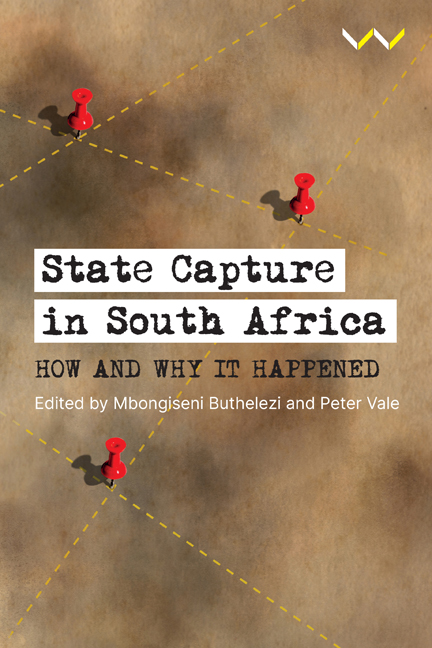Chapter 2 - State Capture, the Racket and Predatory Power
Published online by Cambridge University Press: 28 February 2024
Summary
The term ‘state capture’ was the South African Word of the Year 2017 (Pijoos 2017), ascending in the public consciousness following the release of the Public Protector's ‘State of Capture’ report in the closing months of the previous year (Public Protector 2016). It detailed the findings of an investigation into an alleged corrupt relationship between senior government officials and the Gupta family, who were personally connected to the country's then president, Jacob Zuma. Running to 355 pages, the report suggested that the Guptas had leveraged political influence to irregularly (sometimes illegally) extract rent from the state.
Since the release of the report, South Africans have been inundated with revelations of corruption, maladministration and an array of abuse by those in power. Although the capture of the state has been slowed, the systems that enabled it have not been fully explained. Appreciating why this is so is a secondary interest of this chapter. The primary interest is to draw the South African experience closer to definitions and analytical tools and so to explain the underlying ‘logics’ and patterns of behaviour that fuelled ways in which legitimate authority can be captured.
SETTING THE SCENE
A turning point in the unfolding saga was 7 April 2017, when the post-apartheid state witnessed its largest protests (Business Day 2017). In an extraordinary show of unity, people from various South African communities united behind #ZumaMustFall. The month of mass protests that followed was a direct response to the firing of minister of finance Pravin Gordhan and his deputy, Mcebisi Jonas. The latter's public revelations of an attempted R600-million bribe by the Guptas triggered the Public Protector's initial investigation into the Guptas and their links to the president's family and their cronies.
The alleged bribe was facilitated by the president's son Duduzane Zuma in August 2015 (Jonas 2018). Importantly for our purposes, the bribe was linked to the prediction – by the Guptas – that Jonas was to become the country's next finance minister. Indeed, a few months later, Zuma announced the removal of Nhlanhla Nene, who at the time held the finance portfolio, replacing him with an unknown African National Congress (ANC) backbencher, Des van Rooyen.
- Type
- Chapter
- Information
- State Capture in South AfricaHow and Why It Happened, pp. 39 - 64Publisher: Wits University PressPrint publication year: 2023



